Deck 15: Organic Compounds and the Atomic Properties of Carbon
Question
Question
Question
Question
Question
Question
Question
Question
Question
Question
Question
Question
Question
Question
Question
Question
Question
Question
Question
Question
Question
Question
Question
Question
Question
Question
Question
Question
Question
Question
Question
Question
Question
Question
Question
Question
Question
Question
Question
Question
Question
Question
Question
Question
Question
Question
Question
Question
Question
Question
Question
Question
Question
Question
Question
Question
Question
Question
Question
Question
Question
Question
Question
Question
Question
Question
Question
Question
Question
Question
Question
Question
Question
Question
Question
Question
Question
Question
Question
Question

Unlock Deck
Sign up to unlock the cards in this deck!
Unlock Deck
Unlock Deck
1/118
Play
Full screen (f)
Deck 15: Organic Compounds and the Atomic Properties of Carbon
1
Select the correct name for the following compound. 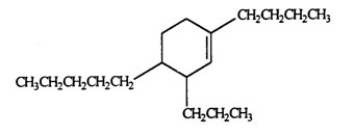
A) 1-butyl-4-pentyl-3-propylcyclohexene
B) 1-butyl-4-pentyl-5-propylcyclohexene
C) 2-butyl-5-pentyl-6-propylcyclohexene
D) 4-butyl-1-pentyl-2-propylcyclohexene
E) 1-butyl-4-pentyl-3-propylbenzene

A) 1-butyl-4-pentyl-3-propylcyclohexene
B) 1-butyl-4-pentyl-5-propylcyclohexene
C) 2-butyl-5-pentyl-6-propylcyclohexene
D) 4-butyl-1-pentyl-2-propylcyclohexene
E) 1-butyl-4-pentyl-3-propylbenzene
1-butyl-4-pentyl-3-propylcyclohexene
2
Select the correct name for the following compound. 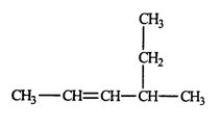
A) 2-ethyl-3-pentene
B) 4-ethyl-2-pentene
C) 3-methyl-4-hexene
D) 4-methyl-2-hexene
E) none of the above

A) 2-ethyl-3-pentene
B) 4-ethyl-2-pentene
C) 3-methyl-4-hexene
D) 4-methyl-2-hexene
E) none of the above
4-methyl-2-hexene
3
Select the correct name for the following compound. 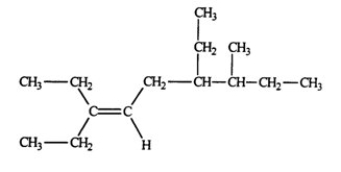
A) cis-2,5-diethyl-6-methyl-3-nonene
B) 2,5-diethyl-6-methyl-3-nonene
C) cis-4,6-diethyl-3-methyl-6-nonene
D) 4,6-diethyl-3-methyl-6-nonene
E) trans-2,5-diethyl-6-methyl-3-nonene

A) cis-2,5-diethyl-6-methyl-3-nonene
B) 2,5-diethyl-6-methyl-3-nonene
C) cis-4,6-diethyl-3-methyl-6-nonene
D) 4,6-diethyl-3-methyl-6-nonene
E) trans-2,5-diethyl-6-methyl-3-nonene
2,5-diethyl-6-methyl-3-nonene
4
Select the correct name for the following compound. 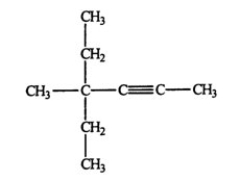
A) 4-4-diethyl-2-pentyne
B) 2,2-diethyl-3-pentyne
C) 2-ethyl-2-methyl-4-hexyne
D) 4-ethyl-4-methyl-2-hexyne
E) 2-ethyl-2-methyl-4-hexene

A) 4-4-diethyl-2-pentyne
B) 2,2-diethyl-3-pentyne
C) 2-ethyl-2-methyl-4-hexyne
D) 4-ethyl-4-methyl-2-hexyne
E) 2-ethyl-2-methyl-4-hexene

Unlock Deck
Unlock for access to all 118 flashcards in this deck.
Unlock Deck
k this deck
5
Select the correct name for the following compound. 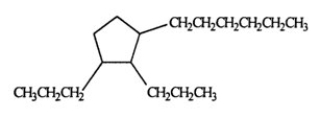
A) ortho-dipropylcyclopentylhexane
B) 2,3-dipropylcyclopentylhexane
C) 2-hexyl-1,5-dipropylcyclopentane
D) 1-hexyl-2,3-dipropylcyclopentane
E) 1,2-dipropyl-3-hexylcyclopentane

A) ortho-dipropylcyclopentylhexane
B) 2,3-dipropylcyclopentylhexane
C) 2-hexyl-1,5-dipropylcyclopentane
D) 1-hexyl-2,3-dipropylcyclopentane
E) 1,2-dipropyl-3-hexylcyclopentane

Unlock Deck
Unlock for access to all 118 flashcards in this deck.
Unlock Deck
k this deck
6
Select the correct name for the following compound. 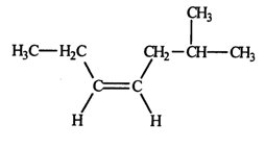
A) cis-2-methyl-4-heptene
B) trans-2-methyl-4-heptene
C) cis-6-methyl-3-heptene
D) trans-6-methyl-3-heptene
E) cis-2-methyl-3-heptene

A) cis-2-methyl-4-heptene
B) trans-2-methyl-4-heptene
C) cis-6-methyl-3-heptene
D) trans-6-methyl-3-heptene
E) cis-2-methyl-3-heptene

Unlock Deck
Unlock for access to all 118 flashcards in this deck.
Unlock Deck
k this deck
7
Select the correct name for the following compound. 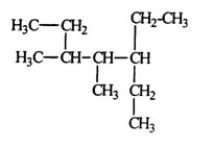
A) 1,1,3-triethyl-2-methylbutane
B) 1,1-diethyl-2,3-dimethylpentane
C) 2,4-diethyl-3-methylhexane
D) 3-ethyl-4,5-dimethylheptane
E) none of the above

A) 1,1,3-triethyl-2-methylbutane
B) 1,1-diethyl-2,3-dimethylpentane
C) 2,4-diethyl-3-methylhexane
D) 3-ethyl-4,5-dimethylheptane
E) none of the above

Unlock Deck
Unlock for access to all 118 flashcards in this deck.
Unlock Deck
k this deck
8
Select the correct name for the following compound. 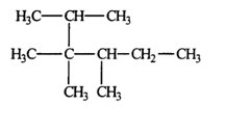
A) 2-isopropyl-2,3,4-trimethylbutane
B) 2-isopropyl-2,3-dimethylpentane
C) 2,3,3,4-tetramethylhexane
D) 1,1,2,2,3-pentamethylpentane
E) none of the above

A) 2-isopropyl-2,3,4-trimethylbutane
B) 2-isopropyl-2,3-dimethylpentane
C) 2,3,3,4-tetramethylhexane
D) 1,1,2,2,3-pentamethylpentane
E) none of the above

Unlock Deck
Unlock for access to all 118 flashcards in this deck.
Unlock Deck
k this deck
9
Select the correct name for the following compound. 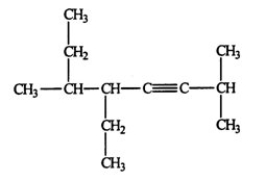
A) 4-ethyl-1,1,5-trimethyl-2-heptyne
B) 4,5-diethyl-1,1-dimethyl-2-heptyne
C) 5-ethyl-2,6-dimethyl-3-octene
D) 3-ethyl-3,7-dimethyl-5-octyne
E) 5-ethyl-2,6-dimethyl-3-octyne

A) 4-ethyl-1,1,5-trimethyl-2-heptyne
B) 4,5-diethyl-1,1-dimethyl-2-heptyne
C) 5-ethyl-2,6-dimethyl-3-octene
D) 3-ethyl-3,7-dimethyl-5-octyne
E) 5-ethyl-2,6-dimethyl-3-octyne

Unlock Deck
Unlock for access to all 118 flashcards in this deck.
Unlock Deck
k this deck
10
Select the correct name for the following compound. 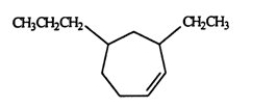
A) 2-ethyl-4-propylcycloheptene
B) 3-ethyl-5-propylcycloheptene
C) 6-ethyl-4-propylcycloheptene
D) 7-ethyl-5-propylcycloheptene
E) 3-ethyl-5-propylcyclohexene

A) 2-ethyl-4-propylcycloheptene
B) 3-ethyl-5-propylcycloheptene
C) 6-ethyl-4-propylcycloheptene
D) 7-ethyl-5-propylcycloheptene
E) 3-ethyl-5-propylcyclohexene

Unlock Deck
Unlock for access to all 118 flashcards in this deck.
Unlock Deck
k this deck
11
Select the correct name for the following compound. 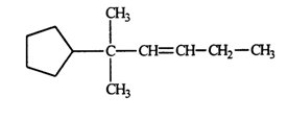
A) 1,1-dimethyl-1-cylcopentyl-2-pentane
B) 1,1-dimethyl-2-hexene-cyclopentane
C) 2-cyclopentyl-2-methyl-3-hexene
D) 5,5-dimethyl-5-cyclopentyl-3-pentane
E) 5,5-dimethyl-5-cyclopentyl-3-pentene

A) 1,1-dimethyl-1-cylcopentyl-2-pentane
B) 1,1-dimethyl-2-hexene-cyclopentane
C) 2-cyclopentyl-2-methyl-3-hexene
D) 5,5-dimethyl-5-cyclopentyl-3-pentane
E) 5,5-dimethyl-5-cyclopentyl-3-pentene

Unlock Deck
Unlock for access to all 118 flashcards in this deck.
Unlock Deck
k this deck
12
Select the correct name for the following compound. 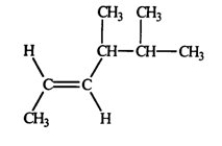
A) cis-2,3-dimethyl-4-hexene
B) trans-2,3-dimethyl-4-hexene
C) cis-4,5-dimethyl-2-hexene
D) trans-4,5-dimethyl-2-hexene
E) trans-4,5-dimethyl-2-heptene

A) cis-2,3-dimethyl-4-hexene
B) trans-2,3-dimethyl-4-hexene
C) cis-4,5-dimethyl-2-hexene
D) trans-4,5-dimethyl-2-hexene
E) trans-4,5-dimethyl-2-heptene

Unlock Deck
Unlock for access to all 118 flashcards in this deck.
Unlock Deck
k this deck
13
Select the correct name for the following compound. 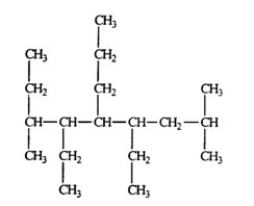
A) 1,2-diethyl-1-methyl-3-propyl-4-isobutylhexane
B) 1,6,6-trimethyl-1,2,4-triethyl-3-propylhexane
C) 1,1,6-trimethyl-3,5,6-triethyl-4-propylhexane
D) 4,6-diethyl-2,7-dimethyl-5-propylnonane
E) 3,5-diethyl-1,1,6-trimethyl-4-propyloctane

A) 1,2-diethyl-1-methyl-3-propyl-4-isobutylhexane
B) 1,6,6-trimethyl-1,2,4-triethyl-3-propylhexane
C) 1,1,6-trimethyl-3,5,6-triethyl-4-propylhexane
D) 4,6-diethyl-2,7-dimethyl-5-propylnonane
E) 3,5-diethyl-1,1,6-trimethyl-4-propyloctane

Unlock Deck
Unlock for access to all 118 flashcards in this deck.
Unlock Deck
k this deck
14
Select the correct name for the following compound. 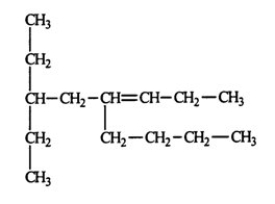
A) 1,1-diethyl-3-butyl-3-hexene
B) 5-butyl-3-ethyl-5-octene
C) 4-butyl-6-ethyl-3-octene
D) 3-ethyl-5-propyl-5-nonene
E) 4-butyl-6-ethyl-3,4-octene

A) 1,1-diethyl-3-butyl-3-hexene
B) 5-butyl-3-ethyl-5-octene
C) 4-butyl-6-ethyl-3-octene
D) 3-ethyl-5-propyl-5-nonene
E) 4-butyl-6-ethyl-3,4-octene

Unlock Deck
Unlock for access to all 118 flashcards in this deck.
Unlock Deck
k this deck
15
Select the correct name for the following compound. 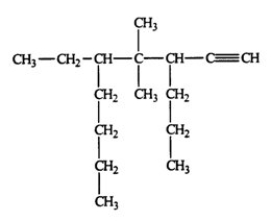
A) 5-butyl-4,4-dimethyl-3-propyl-1-heptene
B) 5-ethyl-4-4-dimethyl-3-propyl-1-nonyne
C) 5-ethyl-6-6-dimethyl-7-propyl-8-nonyne
D) 4,6-diethyl-5-5-dimethyl-4-decyne
E) 5-ethyl-4-4-dimethyl-3-propyl-1-nonene

A) 5-butyl-4,4-dimethyl-3-propyl-1-heptene
B) 5-ethyl-4-4-dimethyl-3-propyl-1-nonyne
C) 5-ethyl-6-6-dimethyl-7-propyl-8-nonyne
D) 4,6-diethyl-5-5-dimethyl-4-decyne
E) 5-ethyl-4-4-dimethyl-3-propyl-1-nonene

Unlock Deck
Unlock for access to all 118 flashcards in this deck.
Unlock Deck
k this deck
16
Select the correct name for the following compound. 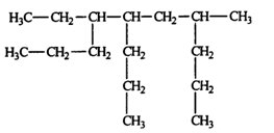
A) 2,4,5-tripropylheptane
B) 6-methyl-3,4-dipropylnonane
C) 4-ethyl-5,7-dipropyloctane
D) 5-ethyl-2,4-dipropyloctane
E) 4-ethyl-7-methyl-5-propyldecane

A) 2,4,5-tripropylheptane
B) 6-methyl-3,4-dipropylnonane
C) 4-ethyl-5,7-dipropyloctane
D) 5-ethyl-2,4-dipropyloctane
E) 4-ethyl-7-methyl-5-propyldecane

Unlock Deck
Unlock for access to all 118 flashcards in this deck.
Unlock Deck
k this deck
17
Select the correct name for the following compound. 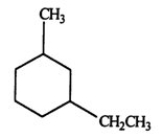
A) 1-ethyl-3-methylcyclohexane
B) 1-methyl-5-ethylcyclohexane
C) meta-ethylmethylcyclohexane
D) meta-ethylmethylbenzene
E) 3-ethyltoluene

A) 1-ethyl-3-methylcyclohexane
B) 1-methyl-5-ethylcyclohexane
C) meta-ethylmethylcyclohexane
D) meta-ethylmethylbenzene
E) 3-ethyltoluene

Unlock Deck
Unlock for access to all 118 flashcards in this deck.
Unlock Deck
k this deck
18
Select the correct name for the following compound. 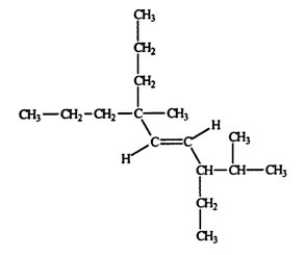
A) cis-3-ethyl-2,6-dimethyl-6-propyl-4-nonene
B) trans-3-ethyl-2,6-dimethyl-6-propyl-4-nonene
C) cis-7-ethyl-4,8-dimethyl-4-propyl-5-nonene
D) trans-7-ethyl-4,8-dimethyl-4-propyl-5-nonene
E) none of the above

A) cis-3-ethyl-2,6-dimethyl-6-propyl-4-nonene
B) trans-3-ethyl-2,6-dimethyl-6-propyl-4-nonene
C) cis-7-ethyl-4,8-dimethyl-4-propyl-5-nonene
D) trans-7-ethyl-4,8-dimethyl-4-propyl-5-nonene
E) none of the above

Unlock Deck
Unlock for access to all 118 flashcards in this deck.
Unlock Deck
k this deck
19
Select the correct name for the following compound. 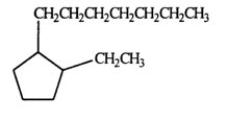
A) ortho-ethylheptylcyclopentane
B) meta-ethylheptylcyclopentane
C) 1-ethyl-2-heptylcyclopentane
D) ethylcyclopentylheptane
E) ortho-ethylheptylbenzene

A) ortho-ethylheptylcyclopentane
B) meta-ethylheptylcyclopentane
C) 1-ethyl-2-heptylcyclopentane
D) ethylcyclopentylheptane
E) ortho-ethylheptylbenzene

Unlock Deck
Unlock for access to all 118 flashcards in this deck.
Unlock Deck
k this deck
20
Select the correct name for the following compound. 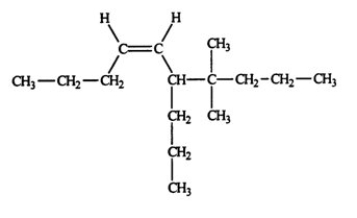
A) cis-2-methyl-2,3-dipropyl-4-octene
B) cis-7-methyl-6,7-dipropyl-4-octene
C) cis-4,4-dimethyl-5-propyl-6-decene
D) trans-7,7-dimethyl-6-propyl-4-decene
E) cis-7,7-dimethyl-6-propyl-4-decene

A) cis-2-methyl-2,3-dipropyl-4-octene
B) cis-7-methyl-6,7-dipropyl-4-octene
C) cis-4,4-dimethyl-5-propyl-6-decene
D) trans-7,7-dimethyl-6-propyl-4-decene
E) cis-7,7-dimethyl-6-propyl-4-decene

Unlock Deck
Unlock for access to all 118 flashcards in this deck.
Unlock Deck
k this deck
21
Alcohols undergo a variety of reactions. Which one of the following reactions is not undergone by the alcohol functional group?
A) substitution
B) addition
C) dehydration
D) oxidation to form a ketone
E) oxidation to form an aldehyde or a carboxylic acid
A) substitution
B) addition
C) dehydration
D) oxidation to form a ketone
E) oxidation to form an aldehyde or a carboxylic acid

Unlock Deck
Unlock for access to all 118 flashcards in this deck.
Unlock Deck
k this deck
22
Select the correct name for the following compound. 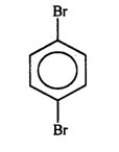
A) ortho-dibromobenzene
B) meta-dibromobenzene
C) para-dibromobenzene
D) 1,4-dibromocyclohexene
E) 1,4-dibromocyclohexane

A) ortho-dibromobenzene
B) meta-dibromobenzene
C) para-dibromobenzene
D) 1,4-dibromocyclohexene
E) 1,4-dibromocyclohexane

Unlock Deck
Unlock for access to all 118 flashcards in this deck.
Unlock Deck
k this deck
23
Select the correct name for the following compound. 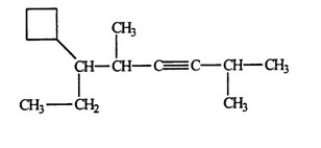
A) 2,5-dimethyl-3-octyne-6-cyclobutane
B) 4-cyclobutyl-1-isopropyl-3-methyl-1-hexyne
C) 3-cyclobutyl-4,7-dimethyl-5-octyne
D) 6-cyclobutyl-2,5-dimethyl-3-octyne
E) 3-cyclobutyl-4,7-dimethyl-5-octene

A) 2,5-dimethyl-3-octyne-6-cyclobutane
B) 4-cyclobutyl-1-isopropyl-3-methyl-1-hexyne
C) 3-cyclobutyl-4,7-dimethyl-5-octyne
D) 6-cyclobutyl-2,5-dimethyl-3-octyne
E) 3-cyclobutyl-4,7-dimethyl-5-octene

Unlock Deck
Unlock for access to all 118 flashcards in this deck.
Unlock Deck
k this deck
24
Select the correct reaction type for the following process. 
A) addition
B) elimination
C) substitution
D) oxidation
E) reduction

A) addition
B) elimination
C) substitution
D) oxidation
E) reduction

Unlock Deck
Unlock for access to all 118 flashcards in this deck.
Unlock Deck
k this deck
25
Select the correct name for the following compound. 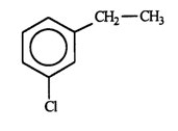
A) meta-chloroethylcyclohexene
B) 1-chloro-5-ethylcyclohexene
C) meta-chloroethylbenzene
D) 1-chloro-5-ethylbenzene
E) 1-chloro-3-ethylcyclohexane

A) meta-chloroethylcyclohexene
B) 1-chloro-5-ethylcyclohexene
C) meta-chloroethylbenzene
D) 1-chloro-5-ethylbenzene
E) 1-chloro-3-ethylcyclohexane

Unlock Deck
Unlock for access to all 118 flashcards in this deck.
Unlock Deck
k this deck
26
Which compound, if any, will be optically active? 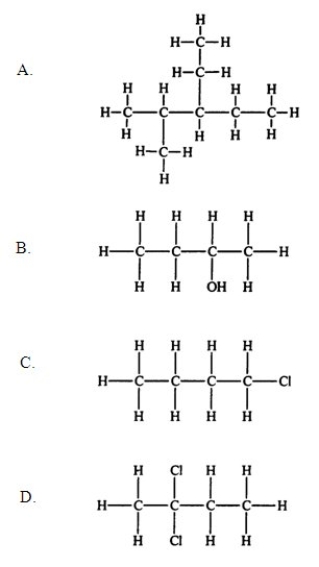
A) A
B) B
C) C
D) D
E) None of the above is optically active.

A) A
B) B
C) C
D) D
E) None of the above is optically active.

Unlock Deck
Unlock for access to all 118 flashcards in this deck.
Unlock Deck
k this deck
27
Which compound, if any, will not be optically active? 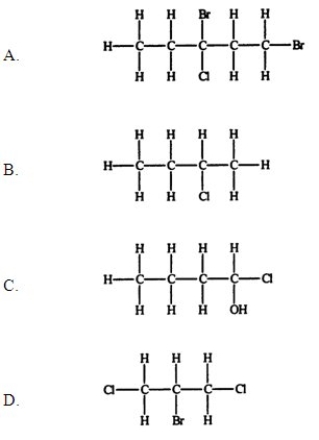
A) A
B) B
C) C
D) D
E) They are all optically active.

A) A
B) B
C) C
D) D
E) They are all optically active.

Unlock Deck
Unlock for access to all 118 flashcards in this deck.
Unlock Deck
k this deck
28
What is the molecular formula of the compound 2,3-dimethyl-4-cyclopentyl-5-ethyldecane?
A) C16H34
B) C17H34
C) C18H36
D) C19H38
E) C20H40
A) C16H34
B) C17H34
C) C18H36
D) C19H38
E) C20H40

Unlock Deck
Unlock for access to all 118 flashcards in this deck.
Unlock Deck
k this deck
29
Select the correct name for the following compound. 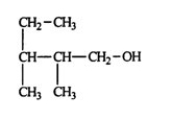
A) 3-ethyl-2,3-dimethyl-1-propanol
B) 2,3,4-trimethyl-1-butanol
C) 2,3-dimethyl-1-pentanol
D) 3,4-dimethyl-5-pentanol
E) 2,3-dimethyl-1-pentanal

A) 3-ethyl-2,3-dimethyl-1-propanol
B) 2,3,4-trimethyl-1-butanol
C) 2,3-dimethyl-1-pentanol
D) 3,4-dimethyl-5-pentanol
E) 2,3-dimethyl-1-pentanal

Unlock Deck
Unlock for access to all 118 flashcards in this deck.
Unlock Deck
k this deck
30
Which of the following features do cyclohexene and 3-methyl-1-pentyne have in common?
A) same physical properties
B) same chemical properties
C) same boiling point
D) same molecular weight
E) same number of double bonds
A) same physical properties
B) same chemical properties
C) same boiling point
D) same molecular weight
E) same number of double bonds

Unlock Deck
Unlock for access to all 118 flashcards in this deck.
Unlock Deck
k this deck
31
Including cyclic compounds, how many possible isomers exist for C4H8?
A) 2
B) 4
C) 5
D) 6
E) 7
A) 2
B) 4
C) 5
D) 6
E) 7

Unlock Deck
Unlock for access to all 118 flashcards in this deck.
Unlock Deck
k this deck
32
What is the difference between 1-butyne and 1-butene?
A) 1 carbon atom
B) 1 carbon atom and 2 hydrogen atoms
C) 2 hydrogen atoms
D) 4 hydrogen atoms
E) 1 carbon atom and 4 hydrogen atoms
A) 1 carbon atom
B) 1 carbon atom and 2 hydrogen atoms
C) 2 hydrogen atoms
D) 4 hydrogen atoms
E) 1 carbon atom and 4 hydrogen atoms

Unlock Deck
Unlock for access to all 118 flashcards in this deck.
Unlock Deck
k this deck
33
Select the correct name for the following compound. 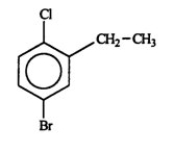
A) para-bromochloro-2-ethylbenzene
B) 4-bromo-1-chloro-2-ethylbenzene
C) 5-bromo-2-chloro-1-ethylbenzene
D) 1-bromo-4-chloro-3-ethylcyclohexene
E) 4-bromo-1-chloro-2-ethylcyclohexane

A) para-bromochloro-2-ethylbenzene
B) 4-bromo-1-chloro-2-ethylbenzene
C) 5-bromo-2-chloro-1-ethylbenzene
D) 1-bromo-4-chloro-3-ethylcyclohexene
E) 4-bromo-1-chloro-2-ethylcyclohexane

Unlock Deck
Unlock for access to all 118 flashcards in this deck.
Unlock Deck
k this deck
34
The reaction of bromine with an alkene such as cyclopentene is a good laboratory test for the presence of a double bond in a compound. What type of reaction is it? 
A) addition
B) elimination
C) substitution
D) displacement
E) reduction

A) addition
B) elimination
C) substitution
D) displacement
E) reduction

Unlock Deck
Unlock for access to all 118 flashcards in this deck.
Unlock Deck
k this deck
35
Select the correct name for the following compound. 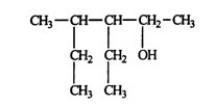
A) 3,4-diethyl-4-methyl-2-butanol
B) 2,3-diethyl-4-pentanol
C) 3,4-diethyl-2-pentanol
D) 3-ethyl-4-methyl-2-hexanol
E) 3-ethyl-4-methyl-2-hexanal

A) 3,4-diethyl-4-methyl-2-butanol
B) 2,3-diethyl-4-pentanol
C) 3,4-diethyl-2-pentanol
D) 3-ethyl-4-methyl-2-hexanol
E) 3-ethyl-4-methyl-2-hexanal

Unlock Deck
Unlock for access to all 118 flashcards in this deck.
Unlock Deck
k this deck
36
Select the correct type for the following reaction. CH3CH2CH2CH2OH + HBr CH3CH2CH2CH2Br + H2O
A) dehydration
B) dehydroxylation
C) addition
D) elimination
E) substitution
A) dehydration
B) dehydroxylation
C) addition
D) elimination
E) substitution

Unlock Deck
Unlock for access to all 118 flashcards in this deck.
Unlock Deck
k this deck
37
Excluding cyclic compounds, how many possible isomers exist for C4H8?
A) 2
B) 4
C) 5
D) 6
E) 7
A) 2
B) 4
C) 5
D) 6
E) 7

Unlock Deck
Unlock for access to all 118 flashcards in this deck.
Unlock Deck
k this deck
38
Select the correct name for the following compound. 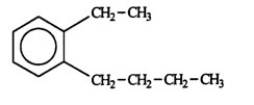
A) ortho-butylethylbenzene
B) meta-butylethylbenzene
C) para-butylethylbenzene
D) 1-butyl-2-ethylcyclohexene
E) 1-butyl-2-ethylcyclohexane

A) ortho-butylethylbenzene
B) meta-butylethylbenzene
C) para-butylethylbenzene
D) 1-butyl-2-ethylcyclohexene
E) 1-butyl-2-ethylcyclohexane

Unlock Deck
Unlock for access to all 118 flashcards in this deck.
Unlock Deck
k this deck
39
Benzene will react with chloromethane in the presence of a catalyst to produce toluene and hydrogen chloride. Select the correct reaction type for the process. 
A) addition
B) elimination
C) substitution
D) oxidation
E) reduction

A) addition
B) elimination
C) substitution
D) oxidation
E) reduction

Unlock Deck
Unlock for access to all 118 flashcards in this deck.
Unlock Deck
k this deck
40
Select the correct name for the following compound. 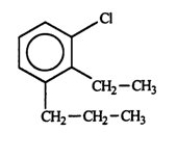
A) 1-chloro-2-ethyl-3-propylcyclohexane
B) 1-chloro-2-ethyl-3-propylcyclohexene
C) 1-chloro-ortho-ethylpropylbenzene
D) 1-chloro-meta-ethylpropylbenzene
E) 1-chloro-2-ethyl-3-propylbenzene

A) 1-chloro-2-ethyl-3-propylcyclohexane
B) 1-chloro-2-ethyl-3-propylcyclohexene
C) 1-chloro-ortho-ethylpropylbenzene
D) 1-chloro-meta-ethylpropylbenzene
E) 1-chloro-2-ethyl-3-propylbenzene

Unlock Deck
Unlock for access to all 118 flashcards in this deck.
Unlock Deck
k this deck
41
Putrescine is produced during the decay and protein breakdown of meats and is responsible for some of the odor found in them. Identify the functional group circled. 
A) aldehyde
B) ketone
C) amide
D) nitrile
E) amine

A) aldehyde
B) ketone
C) amide
D) nitrile
E) amine

Unlock Deck
Unlock for access to all 118 flashcards in this deck.
Unlock Deck
k this deck
42
Select the correct type for the following reaction. 
A) addition
B) elimination
C) carbonylation
D) dehydration
E) oxidation

A) addition
B) elimination
C) carbonylation
D) dehydration
E) oxidation

Unlock Deck
Unlock for access to all 118 flashcards in this deck.
Unlock Deck
k this deck
43
Select the correct type for the following reaction. 
A) addition
B) elimination
C) substitution
D) oxidation
E) dehydrogenation

A) addition
B) elimination
C) substitution
D) oxidation
E) dehydrogenation

Unlock Deck
Unlock for access to all 118 flashcards in this deck.
Unlock Deck
k this deck
44
Identify the functional group circled. 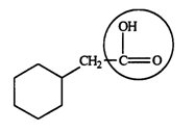
A) aldehyde
B) ketone
C) alcohol
D) ester
E) carboxylic acid

A) aldehyde
B) ketone
C) alcohol
D) ester
E) carboxylic acid

Unlock Deck
Unlock for access to all 118 flashcards in this deck.
Unlock Deck
k this deck
45
Amygdalin (Laetrile) was once touted for its potential anticancer activity. However, the claims were never scientifically verified. Identify the functional group circled. 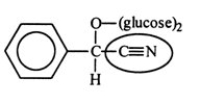
A) carbonite
B) ether
C) amide
D) amine
E) nitrile

A) carbonite
B) ether
C) amide
D) amine
E) nitrile

Unlock Deck
Unlock for access to all 118 flashcards in this deck.
Unlock Deck
k this deck
46
Serotonin transmits nerve impulses through the body. Identify the functional group circled. 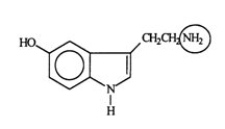
A) aldehyde
B) alcohol
C) amide
D) amine
E) nitride

A) aldehyde
B) alcohol
C) amide
D) amine
E) nitride

Unlock Deck
Unlock for access to all 118 flashcards in this deck.
Unlock Deck
k this deck
47
Acetaminophen is a widely used and an effective pain reliever. Identify the functional group circled. 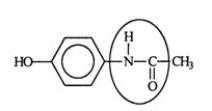
A) aldehyde
B) alcohol
C) amide
D) amine
E) carbonyl

A) aldehyde
B) alcohol
C) amide
D) amine
E) carbonyl

Unlock Deck
Unlock for access to all 118 flashcards in this deck.
Unlock Deck
k this deck
48
Glucose is an important sugar in a person's metabolic cycle. Identify the functional group circled. 
A) aldehyde
B) ketone
C) alcohol
D) ester
E) carboxylic acid

A) aldehyde
B) ketone
C) alcohol
D) ester
E) carboxylic acid

Unlock Deck
Unlock for access to all 118 flashcards in this deck.
Unlock Deck
k this deck
49
The compound shown below is responsible for the odor in rancid butter. Identify the functional group circled. 
A) aldehyde
B) ketone
C) alcohol
D) carboxylic acid
E) carbonyl

A) aldehyde
B) ketone
C) alcohol
D) carboxylic acid
E) carbonyl

Unlock Deck
Unlock for access to all 118 flashcards in this deck.
Unlock Deck
k this deck
50
Benzocaine is from a family of chemicals that are good local anesthetics. Identify the functional group circled. 
A) aldehyde
B) ketone
C) ester
D) carboxylic acid
E) carbonyl

A) aldehyde
B) ketone
C) ester
D) carboxylic acid
E) carbonyl

Unlock Deck
Unlock for access to all 118 flashcards in this deck.
Unlock Deck
k this deck
51
Anethole, a derivative of anise, is used in flavoring and as perfume in soap and toothpaste. Identify the functional group circled. 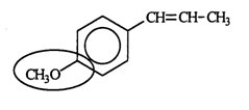
A) aldehyde
B) ketone
C) alcohol
D) ester
E) ether

A) aldehyde
B) ketone
C) alcohol
D) ester
E) ether

Unlock Deck
Unlock for access to all 118 flashcards in this deck.
Unlock Deck
k this deck
52
Vanillin is a flavoring agent which occurs naturally in the vanilla bean, the seed of an orchid. Identify the functional group circled. 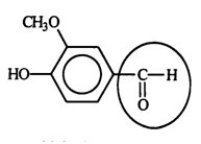
A) aldehyde
B) ketone
C) alcohol
D) carboxylic acid
E) carbonyl

A) aldehyde
B) ketone
C) alcohol
D) carboxylic acid
E) carbonyl

Unlock Deck
Unlock for access to all 118 flashcards in this deck.
Unlock Deck
k this deck
53
Testosterone is a male hormone. Identify the functional group circled. 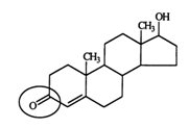
A) aldehyde
B) ketone
C) alcohol
D) ester
E) carboxyl

A) aldehyde
B) ketone
C) alcohol
D) ester
E) carboxyl

Unlock Deck
Unlock for access to all 118 flashcards in this deck.
Unlock Deck
k this deck
54
One source of a musky odor in perfumes is civetone, a compound extracted from the scent gland of the civet cat. Identify the functional group circled. 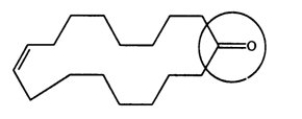
A) aldehyde
B) ketone
C) alcohol
D) carboxylic acid
E) oxide

A) aldehyde
B) ketone
C) alcohol
D) carboxylic acid
E) oxide

Unlock Deck
Unlock for access to all 118 flashcards in this deck.
Unlock Deck
k this deck
55
Enflurane is an effective gaseous anesthetic with relatively low flammability. Identify the functional group circled. 
A) aldehyde
B) ketone
C) ester
D) ether
E) alcohol

A) aldehyde
B) ketone
C) ester
D) ether
E) alcohol

Unlock Deck
Unlock for access to all 118 flashcards in this deck.
Unlock Deck
k this deck
56
Aspirin is an effective and widely used pain reliever. Identify the functional group circled. 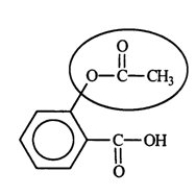
A) aldehyde
B) ketone
C) ester
D) carboxylic acid
E) carbonyl

A) aldehyde
B) ketone
C) ester
D) carboxylic acid
E) carbonyl

Unlock Deck
Unlock for access to all 118 flashcards in this deck.
Unlock Deck
k this deck
57
Select the correct type for the following reaction. 
A) addition
B) elimination
C) substitution
D) oxidation
E) reduction

A) addition
B) elimination
C) substitution
D) oxidation
E) reduction

Unlock Deck
Unlock for access to all 118 flashcards in this deck.
Unlock Deck
k this deck
58
The millipede ejects the compound shown below to protect itself from its enemies. Identify the functional group circled. 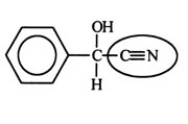
A) nitrile
B) alcohol
C) amide
D) amine
E) nitro

A) nitrile
B) alcohol
C) amide
D) amine
E) nitro

Unlock Deck
Unlock for access to all 118 flashcards in this deck.
Unlock Deck
k this deck
59
Urea carries waste nitrogen from the body in urine. Identify the functional group circled. 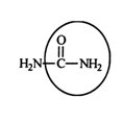
A) aldehyde
B) alcohol
C) carboxyl
D) amine
E) amide

A) aldehyde
B) alcohol
C) carboxyl
D) amine
E) amide

Unlock Deck
Unlock for access to all 118 flashcards in this deck.
Unlock Deck
k this deck
60
Glycerin is used in cosmetics as a moisturizer. Identify the functional group circled. 
A) carboxylic acid
B) alcohol
C) ester
D) ether
E) aldehyde

A) carboxylic acid
B) alcohol
C) ester
D) ether
E) aldehyde

Unlock Deck
Unlock for access to all 118 flashcards in this deck.
Unlock Deck
k this deck
61
Identify the organic product for the reaction of 2-pentanol with sulfuric acid. 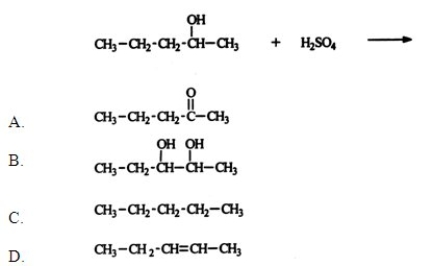
A) A
B) B
C) C
D) D
E) None of the above is a major product of the reaction.

A) A
B) B
C) C
D) D
E) None of the above is a major product of the reaction.

Unlock Deck
Unlock for access to all 118 flashcards in this deck.
Unlock Deck
k this deck
62
Identify the products of the following reaction. 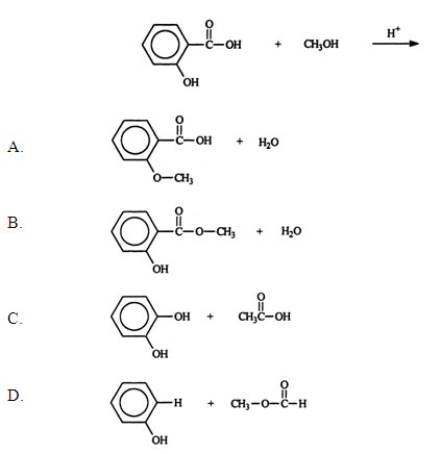
A) A
B) B
C) C
D) D
E) None of the above pairs of compounds are formed in the reaction.

A) A
B) B
C) C
D) D
E) None of the above pairs of compounds are formed in the reaction.

Unlock Deck
Unlock for access to all 118 flashcards in this deck.
Unlock Deck
k this deck
63
Identify the products for the reaction between cycloheptene and bromine. 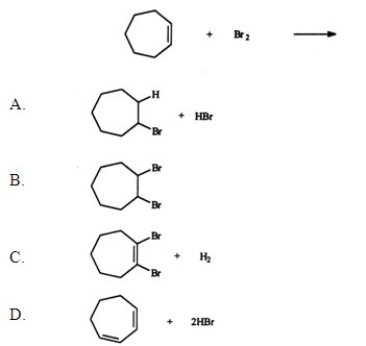
A) A
B) B
C) C
D) D
E) None of the above are the major products of the reaction.

A) A
B) B
C) C
D) D
E) None of the above are the major products of the reaction.

Unlock Deck
Unlock for access to all 118 flashcards in this deck.
Unlock Deck
k this deck
64
Which of the following polymers is a condensation polymer?
A) polystyrene
B) Teflon
C) polyvinylchloride
D) polypropylene
E) Dacron
A) polystyrene
B) Teflon
C) polyvinylchloride
D) polypropylene
E) Dacron

Unlock Deck
Unlock for access to all 118 flashcards in this deck.
Unlock Deck
k this deck
65
Identify the principal organic product of the reaction between butane and chlorine. 
A) CH3Cl
B) CH3CH2Cl
C) CH3CHClCH3
D) CH3CH2CHClCH3
E) None of the above is a major product of the reaction.

A) CH3Cl
B) CH3CH2Cl
C) CH3CHClCH3
D) CH3CH2CHClCH3
E) None of the above is a major product of the reaction.

Unlock Deck
Unlock for access to all 118 flashcards in this deck.
Unlock Deck
k this deck
66
Identify the principal organic product when benzyl chloride reacts with aqueous sodium hydroxide. 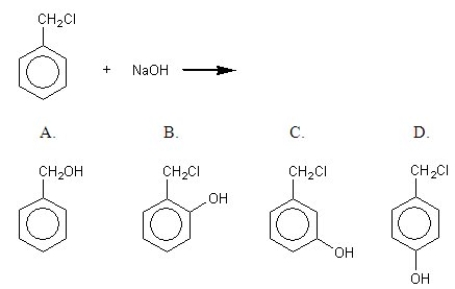
A) A
B) B
C) C
D) D
E) none of the above

A) A
B) B
C) C
D) D
E) none of the above

Unlock Deck
Unlock for access to all 118 flashcards in this deck.
Unlock Deck
k this deck
67
Identify the organic product when cyclohexanol reacts with excess potassium dichromate in the presence of sulfuric acid. 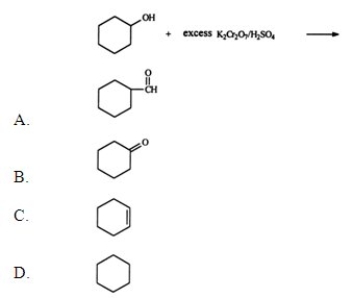
A) A
B) B
C) C
D) D
E) None of the above is a major product of the reaction.

A) A
B) B
C) C
D) D
E) None of the above is a major product of the reaction.

Unlock Deck
Unlock for access to all 118 flashcards in this deck.
Unlock Deck
k this deck
68
Nylon-type compounds are prepared by the reaction of
A) a diol with a diacid.
B) an alcohol with a diacid.
C) a diamine with a diacid.
D) an amine with a diacid.
E) a diamine with an acid.
A) a diol with a diacid.
B) an alcohol with a diacid.
C) a diamine with a diacid.
D) an amine with a diacid.
E) a diamine with an acid.

Unlock Deck
Unlock for access to all 118 flashcards in this deck.
Unlock Deck
k this deck
69
Dacron is a ___________ compound and is produced by a __________ reaction.
A) polyamide; addition
B) polyamide; condensation
C) polyester; addition
D) polyester; condensation
E) polyene; addition
A) polyamide; addition
B) polyamide; condensation
C) polyester; addition
D) polyester; condensation
E) polyene; addition

Unlock Deck
Unlock for access to all 118 flashcards in this deck.
Unlock Deck
k this deck
70
Identify the organic product when cyclopentanol reacts with sulfuric acid. 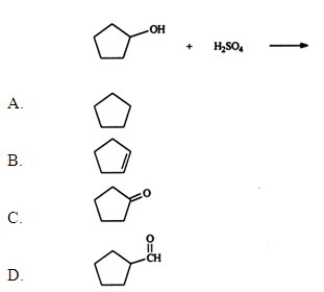
A) A
B) B
C) C
D) D
E) None of the above is a major product of the reaction.

A) A
B) B
C) C
D) D
E) None of the above is a major product of the reaction.

Unlock Deck
Unlock for access to all 118 flashcards in this deck.
Unlock Deck
k this deck
71
Identify the organic product when 3-cylcobutyl-1-propanol reacts with excess potassium dichromate in sulfuric acid. 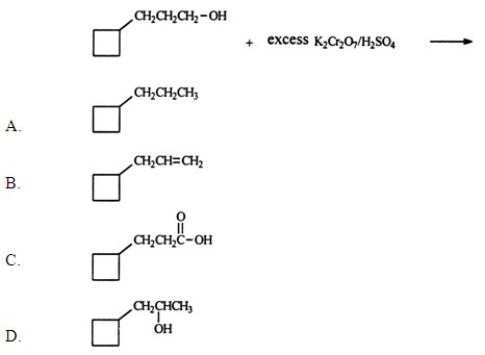
A) A
B) B
C) C
D) D
E) None of the above is a major product of the reaction.

A) A
B) B
C) C
D) D
E) None of the above is a major product of the reaction.

Unlock Deck
Unlock for access to all 118 flashcards in this deck.
Unlock Deck
k this deck
72
Identify the principal organic products for the following reaction. 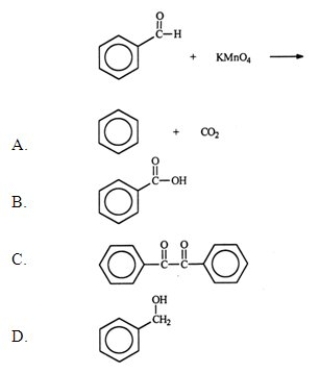
A) A
B) B
C) C
D) D
E) None of the above are the major products of the reaction.

A) A
B) B
C) C
D) D
E) None of the above are the major products of the reaction.

Unlock Deck
Unlock for access to all 118 flashcards in this deck.
Unlock Deck
k this deck
73
Identify the products of the reaction of 3-octene with chlorine. 
A)
B)
C)
D)
E)

A)

B)

C)

D)

E)


Unlock Deck
Unlock for access to all 118 flashcards in this deck.
Unlock Deck
k this deck
74
Each amino acid has two functional groups in common and one of 20 other groups attached to the -carbon. The two functional groups are
A) carboxyl and amine.
B) ester and amine.
C) carboxyl and amide.
D) alcohol and amine.
E) carboxyl and peptide.
A) carboxyl and amine.
B) ester and amine.
C) carboxyl and amide.
D) alcohol and amine.
E) carboxyl and peptide.

Unlock Deck
Unlock for access to all 118 flashcards in this deck.
Unlock Deck
k this deck
75
Helical and sheet-like segments in proteins arise from
A) disulfide bridges.
B) salt bridges.
C) crosslinking via covalent bonds.
D) dispersion forces within the protein's interior.
E) hydrogen bonding.
A) disulfide bridges.
B) salt bridges.
C) crosslinking via covalent bonds.
D) dispersion forces within the protein's interior.
E) hydrogen bonding.

Unlock Deck
Unlock for access to all 118 flashcards in this deck.
Unlock Deck
k this deck
76
Identify the two principal products of the reaction between ammonia and ethyl propionate. 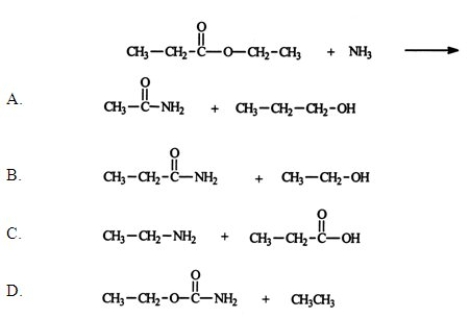
A) A
B) B
C) C
D) D
E) None of the above is a major product of the reaction.

A) A
B) B
C) C
D) D
E) None of the above is a major product of the reaction.

Unlock Deck
Unlock for access to all 118 flashcards in this deck.
Unlock Deck
k this deck
77
Identify the products of the reaction between 2-bromopentane and potassium ethoxide. 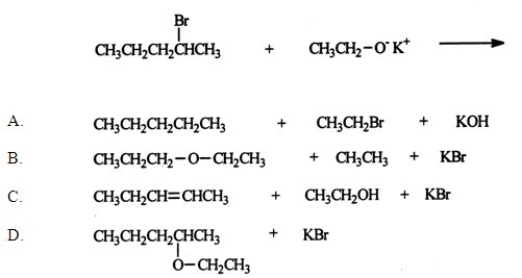
A) A
B) B
C) C
D) D
E) None of the above are the major products of the reaction.

A) A
B) B
C) C
D) D
E) None of the above are the major products of the reaction.

Unlock Deck
Unlock for access to all 118 flashcards in this deck.
Unlock Deck
k this deck
78
One characteristic of the monomers that form condensation polymers that is not common in monomers which form addition polymers is
A) the presence of pi bonds.
B) the presence of two functional groups.
C) the presence of alkyl side chains.
D) the ability to form free radicals.
E) the presence of sulfur atoms.
A) the presence of pi bonds.
B) the presence of two functional groups.
C) the presence of alkyl side chains.
D) the ability to form free radicals.
E) the presence of sulfur atoms.

Unlock Deck
Unlock for access to all 118 flashcards in this deck.
Unlock Deck
k this deck
79
The most abundant organic chemical on earth is
A) glycogen.
B) starch.
C) cellulose.
D) glucose.
E) carbonate.
A) glycogen.
B) starch.
C) cellulose.
D) glucose.
E) carbonate.

Unlock Deck
Unlock for access to all 118 flashcards in this deck.
Unlock Deck
k this deck
80
Which one of the following classes of organic compound does not contain the carbonyl (C=O) group?
A) aldehydes
B) carboxylic acids
C) ketones
D) alcohols
E) esters
A) aldehydes
B) carboxylic acids
C) ketones
D) alcohols
E) esters

Unlock Deck
Unlock for access to all 118 flashcards in this deck.
Unlock Deck
k this deck


